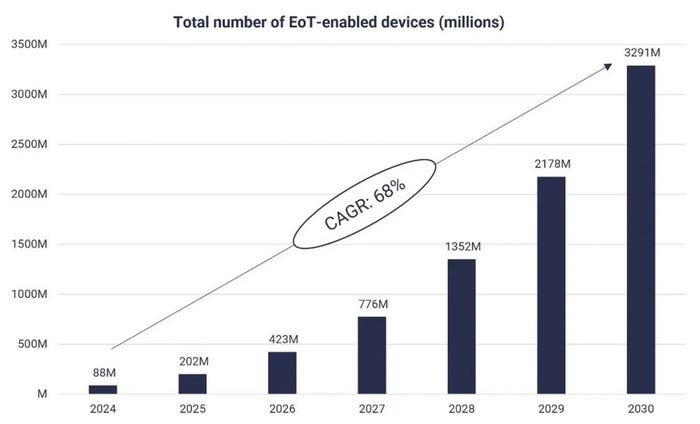3.3 billion EoT devices will be trading with each other by 2030, apparently3.3 billion EoT devices will be trading with each other by 2030, apparently
A report – commissioned by Vodafone and carried out by STL Partners – estimates there will be 88 million devices next year that can ‘independently and securely trade together’, rising to 3.3 billion by 2030.
June 1, 2023

A report – commissioned by Vodafone and carried out by STL Partners – estimates there will be 88 million devices next year that can ‘independently and securely trade together’, rising to 3.3 billion by 2030.
The Economy of Things isn’t a term that’s as widely used the Internet of Things, and the report describes it as ‘a world in which vehicles, devices and machines can interact and transact with each other via a secure digital platform’.
It says around 75% of the data currently generated by connected IoT devices cannot be shared across different devices and systems, and this represents ‘a vast untapped resource of value that is yet to be realised.’
Vehicles will have the most EoT-enabled devices by 2030, since vehicle telematics is already relatively mature, we’re told, and the data collected in the ecosystem is highly valued.
It also forecasts that there will be more than 1.2 billion EoT-enabled smart grid devices by 2030 and 700 million supply chain devices. It gives an example of a smart grid device as something that enables IoT data to be analysed with AI to predict surges in demand for energy, sell spare capacity back to the grid.

“IoT has always operated in siloes, with devices only communicating within the domain of the supplier of the device,” said Jorge Bento, CEO of DAB at Vodafone. “Frictionless interoperability between devices, people and sensors in the IoT domain and beyond provides an enormous monetisation opportunity for our partners and business customers.”
David Palmer, Head of Product Management for DAB, Vodafone, added: “The huge opportunity and primary source of revenue for the EoT comes from generating data from IoT devices and sensors in real-time. These incorporate AI algorithms to generate monetizable events for subsequent transactions through smart contracts.”
The point of this future gazing appears to be to sell the merits of a more unified platform to process all these transactions – and specifically the merits of its own Digital Asset Broker (DAB) EoT platform it launched last year. The vision was stated at the time as IoT devices like vehicles, smart street furniture, and other things to transact with each other without any human intervention.
In May it announced that it will spin off its Economy of Things assets – including the DAB platform, intellectual property, contracts, technology, and software – into a new business. It is also looking to sell a 20% stake in this new venture to Japanese conglomerate Sumitomo Corporation.
Vodafone is looking to capitalise on IoT on a number of fronts – recently it announced a dedicated healthcare division intended to work with the NHS and other healthcare providers (both private and public) in order to create tech enabled solutions for patients including IoT products.
Get the latest news straight to your inbox. Register for the Telecoms.com newsletter here.
About the Author
You May Also Like










.png?width=300&auto=webp&quality=80&disable=upscale)


_1.jpg?width=300&auto=webp&quality=80&disable=upscale)